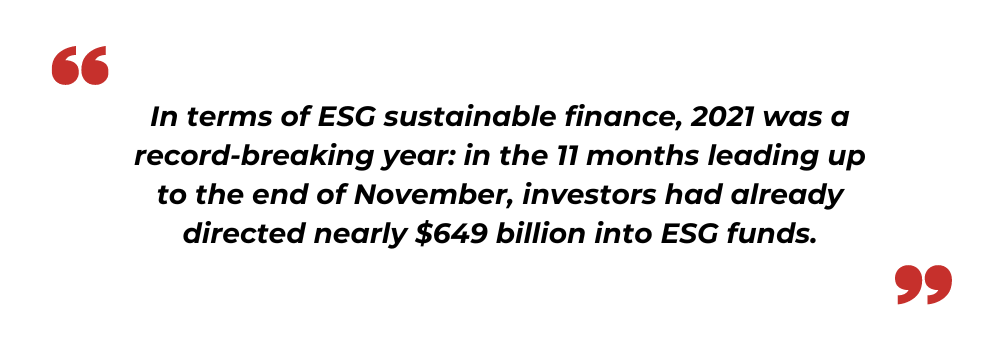The financial services industry is rising up to the plate as environmental and social responsibility becomes more important. Due to low interest rates, increased regulation expenses and the COVID-19 crisis, banks are facing significant headwinds when it comes to ESG requirements. Card payments are an example of long-term initiatives in the banking industry. Every year, 3.5 billion (Thales) new bank cards are manufactured; the amount of plastic used in this process weighs a lot, and that's a lot of plastic.

In order to achieve these systemic reforms, the financial sector, which serves as the backbone of the system by providing the resources needed to run enterprises, must act responsibly and recognise the importance of its position. There is a pressing need for businesses to include environmental, social, and governance (ESG) considerations into their overall strategy to manage risks and returns, while also ensuring that we develop resilient systems for long-term value generation.
.jpg)
ESG investment opportunities are being discussed more frequently in 2022 (GlobalData) by financial services, power, oil & gas, and pharmaceutical firms. Finance does play an important part in the long-term restructuring of the economy, after all. Finance has a unique potential to better manage risks, increase returns, and create a more robust economy that can withstand future crises while also creating long-term value.
The Next Big Thing in Banking can be ESG.
When it comes to making money, doing good for others always wins. That's why finance executives are looking to ESG for new business opportunities. Think of the financial industry and chances are you won't think of sustainability at first. Increasingly, customers are making their expectations known through social media, pressuring companies to act in ways that line with their values of social responsibility.
Even in the financial services sector, ESG in finance is important since it affects everything from climate change to fossil fuels to alternative energy sources to capital markets and the banking business.
Both from a risk and an alignment with social forces perspective, it is evident that the industry's greatest interest is to address ESG in a proactive manner.
For some years now, financial institutions have been on this path. To maintain correct business procedures in areas like anti-money laundering, they have cooperated with regulators for years. This is a goal that continues to drive technical advances in the banking industry today. To combat a wide range of issues like terrorist funding and human trafficking, these capabilities are being used in conjunction with other legislation like Know Your Customer (KYC).
What Impact does ESG in Finance have on Banks?
A growing number of Indian mutual fund companies are embracing ESG funds in an effort to attract private equity as a result of increased societal and regulatory pressure. When it comes to assessing a company, ESG finance criteria are becoming increasingly important for large financial institutions since they can assist them identify organizations that may not be sustainable or constitute a financial risk because of their practices.
Companies who conform to ESG guidelines are entitled to preferential treatment from banks and other financial institutions. ESG standards are becoming a major problem for banks to overcome in a period of low interest rates, rising external operating and capital expenses owing to regulation. Environmental, social, and governance (ESG) themes have gained prominence in global capital investments in recent years.
Long-term economic reconfiguration depends in large part on the financial services industry. In spite of the fact that ESG finance is becoming increasingly popular around the world, investors and regulators must work together to develop standards for these investments. Because of this, all serious lenders must invest a significant amount of time and money to improve the data and analytics used to quantify ESG variables and integrate them into their lending platforms.
New possibilities for the financial services industry
In terms of ESG sustainable finance, 2021 was a record-breaking year: in the 11 months leading up to the end of November, investors had already directed nearly $649 billion (Flow) into ESG funds. Non-financial firms rely on banks to fund nearly half of their capital expenditures, making them a critical part of this economic transition. In addition to assisting in the reallocation of resources to low-carbon activities, they have the potential to fund necessary transitional measures.

A new economy based on ecosystems that meet fundamental human needs and desires, while simultaneously addressing pressing social issues, is the critical potential for financial services firms. In a consumer-driven economy, capacities are arranged around the most fundamental human needs and desires. Traditional industrial value chains place the customer at the end of a chain of B2B partnerships, whereas these new arrangements put customers at the heart of the business.
Human needs will be met more directly and forcefully than ever before by the overlapping value webs that surround them. It is in the best interest of banks to include ESG finance and principles into their business model. This helps in better understanding and engaging with their clients on their own climate risks as well as their ESG sustainable finance transformations.
.jpg)
Among the most important things to do are:
-
Use industry data, risk indices, physical climate models, and the viewpoints of key stakeholders to assess the implications of ESG for your firm.
-
The physical, transition, and reputational risks connected with ESG for your organization should be analyzed and established.
-
Perform an evaluation of the necessity of external reporting. Several financial institutions have already adopted reporting frameworks around the world.
-
Taking the steps outlined above will help an organization's ESG goals be implemented in a way that is in line with its tolerance for risk and will align its practices with existing frameworks for environmental resource management and resilience.
Institutional and retail (non-institutional) investors, as well as those in established and developing markets, are increasingly using ESG risks as a way to evaluate the performance of the firms they hold as part of their investment strategy. A company's future success depends on its ability to meet the demands of a worldwide customer base that is becoming increasingly concerned about environmental preservation, human rights, and corporate transparency.
.jpg)
Studies have revealed that companies with high environmental, social, and governance (ESG) ratings fared better during the crisis than their counterparts, which is prompting more financial institutions to consider ESG when making investment decisions going forward. This shift to ESG sustainable finance, which includes asset management and ownership as well as socially responsible investing, has major implications for both investors and organizations.
Also Read - ESG and Impact Investing: The Future of Responsible Finance
Conclusion
The company providing financial services has already started making efforts to investigate, monitor, and report on ESG targets and goals. In the past, environmental, social, and governance (ESG) factors were often seen as a trade-off between having a positive impact on the community and achieving financial goals. If the private sector is going to be able to handle some of society's most important concerns for the future, it must not only take on larger obligations but also assume positions of leadership.
If an organization is proactive and thorough in determining the impact that environmental, social, and governance (ESG) concerns and climate change have on its operations, then the organization's most valuable assets will be better preserved. Concerns relating to ESG in finance are gaining more notoriety all around the world, and as a consequence, the need to take action is becoming more pressing.
With a presence in New York, San Francisco, Austin, Seattle, Toronto, London, Zurich, Pune, Bengaluru, and Hyderabad, SG Analytics, a pioneer in Research and Analytics, offers tailor-made services to enterprises worldwide.
A leader in ESG Consulting services, SG Analytics offers bespoke sustainability consulting services and research support for informed decision-making. Contact us today if you are in search of an efficient ESG integration and management solution provider to boost your sustainable performance.









